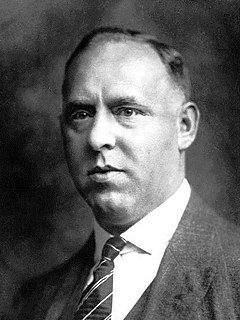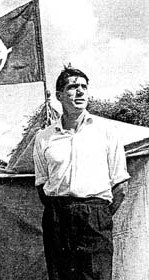Related Research Articles
The British National Party (BNP) is a far-right, fascist political party in the United Kingdom. It is headquartered in Wigton, Cumbria, and its current leader is Adam Walker. A minor party, it has no elected representatives at any level of UK government. Founded in 1982, the party reached its greatest level of success in the 2000s, when it had over fifty seats in local government, one seat on the London Assembly, and two Members of the European Parliament.

John Hutchyns Tyndall was a British fascist political activist. A leading member of various small neo-Nazi groups during the late 1950s and 1960s, he was chairman of the National Front (NF) from 1972 to 1974 and again from 1975 to 1980, and then chairman of the British National Party (BNP) from 1982 to 1999. He unsuccessfully stood for election to the House of Commons and European Parliament on several occasions.

The National Front (NF) is a far-right, fascist political party in the United Kingdom. It is currently led by Tony Martin. As a minor party, it has never had its representatives elected to the British or European Parliaments, although it gained a small number of local councillors through defections and it has had a few of its representatives elected to community councils. Founded in 1967, it reached the height of its electoral support during the mid-1970s, when it was briefly the UK's fourth-largest party in terms of vote share.

Strasserism is a strand of Nazism that calls for a more radical, mass-action and worker-based form of Nazism—hostile to Jews not from a racial, cultural, or religious perspective, but from an economic antisemite basis—to achieve a national rebirth. It derives its name from Gregor and Otto Strasser, two brothers initially associated with this position.

Andrew Fountaine was an activist involved in the British far right. After military service in a number of conflicts Fountaine joined the Conservative Party and was selected as a parliamentary candidate until his outspoken views resulted in his being disowned by the party.
Derek William Beackon is a British National Front politician and former British National Party (BNP) member. In 1993, he became the party's first elected councillor, although he served for only eight months.
The Greater Britain Movement was a British far right political group formed by John Tyndall in 1964 after he split from Colin Jordan's National Socialist Movement. The name of the group was derived from The Greater Britain, a 1932 book by Oswald Mosley.
Martin Wingfield is a British far-right politician. Wingfield is long-standing figure in the British nationalist movement, he and his wife, Tina Wingfield, having contested several elections since the 1980s.
Andrew Henry William Brons is a British politician and former MEP. Long active in far-right politics in Britain, he was elected as a Member of the European Parliament (MEP) for Yorkshire and the Humber for the British National Party (BNP) at the 2009 European Parliament election. He was the Chairman of the National Front in the early 1980s. He resigned the BNP whip in October 2012 and became patron of the British Democratic Party. He did not seek re-election in 2014.
Martin Guy Alan Webster is a British neo-nazi, a former leading figure on the far-right in the United Kingdom. An early member of the National Labour Party, he was John Tyndall's closest ally, and followed him in joining the original British National Party, the National Socialist Movement and the Greater Britain Movement. Webster also spent time in prison for helping to organise a paramilitary organisation, Spearhead, and was convicted under the Public Order Act 1936. Rumours of his homosexuality led to him becoming vilified in far-right circles, and he quietly disappeared from the political scene.
The Official National Front (ONF) was one of two far-right groups to emerge in the United Kingdom in 1986 following a split within the National Front. Following ideological paths that were mostly new to the Far right in the United Kingdom, the ONF stood opposed to the more traditionalist Flag Group.
The Nationalist Alliance was a far-right movement in British politics that aimed to serve as an umbrella group for the various white supremacist groups in Britain. The party was registered with the Electoral Commission in 2005, although its registration has since lapsed.
Eddy Morrison was a British neo-Nazi political activist, who was involved in a number of movements throughout his career.
Richard Charles Edmonds was an English politician. He was the deputy chairman and national organiser of the British National Party (BNP) and also prominent in the National Front (NF) during two spells of membership.
John Morse is a British political activist involved with the far-right. He was a leading figure in the British National Party under John Tyndall, serving alongside Richard Edmonds as Tyndall's closest ally in the party.
Charles Parker was a leading member of the British National Party in its early years and provided the group with much of its funding.
Graham Keith Williamson is a long-time political activist in the United Kingdom, having been active at the top levels of various far right groups including the National Front, the Third Way and Solidarity.
The British National Party (BNP) is a far-right political party in the United Kingdom formed as a splinter group from the National Front by John Tyndall in 1982 and was led by Nick Griffin from September 1999 to July 2014. Its current chairman is Adam Walker. The BNP platform is centred on the advocacy of "firm but voluntary incentives for immigrants and their descendants to return home", as well as the repeal of anti-discrimination legislation. It restricted membership to "indigenous British" people until a 2010 legal challenge to its constitution.
The history of the National Front, a far-right political party in the United Kingdom, began in 1967, when it was founded by A. K. Chesterton.
References
- ↑ Gerry Gable, 'The Far Right in Contemporary Britain', L. Cheles, R. Ferguson, and M. Vaughan, Neo-Fascism in Europe, London: Longman, 1992, p. 252
- 1 2 Gable, 'The Far Right in Contemporary Britain', p. 255
- ↑ N. Copsey, Contemporary British Fascism: The British National Party and the Quest for Legitimacy, Basingstoke: Palgrave Macmillan, 2004, p. 36
- ↑ Piero Ignazi, Extreme Right Parties in Western Europe, Oxford University Press, 2006, p. 182
- 1 2 European Parliament, Committee of Inquiry on Racism and Xenophobia - Report on the Findings of the Inquiry, Luxembourg: Office for Official Publications of the European Communities, 1991, p. 38
- ↑ Martin Durham, Women and Fascism, Routledge, 1998, p. 130
- ↑ Durham, Women and Fascism, pp. 129-130
- ↑ Anthony King, The European Ritual: Football in the New Europe, Ashgate Publishing, Ltd., 2003, p. 231
- ↑ Copsey, Contemporary British Fascism, p. 36
- 1 2 Copsey, Contemporary British Fascism, p. 37
- ↑ Copsey, Contemporary British Fascism, pp. 37-38
- ↑ Gable, 'The Far Right in Contemporary Britain', p. 259
- 1 2 David Boothroyd, Politico's Guide to the History of British Political Parties , 2001, p. 190
- 1 2 Copsey, Contemporary British Fascism, p. 46
- ↑ Copsey, Contemporary British Fascism, p. 38
- ↑ Ignazi, Extreme Right Parties in Western Europe, p. 181